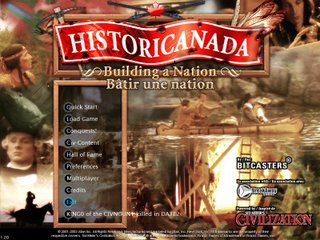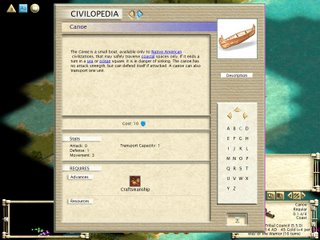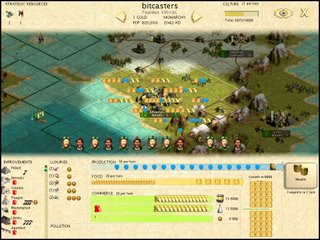Changing the future of Canadian history
I can't believe I haven't blogged about The HistoriCanada Project yet. For the past year and a half, I've been quite lucky to be part of building what could/should very well be one of the most significant innovations in Canadian educational technology. Spanning education, new media, the Internet and Canadian history and patriotism, it's a project that excites me as an entrepreneur, as a parent and as a proud Canadian.

The brainchild of Thomas Axworthy and Nathon Gunn almost a decade in the making, HistoriCanada is the world's first computer game to simulate the history of Canada. It puts players in control of Canada's destiny as it evolves from initial settlements to a coast-to-coast nation. Assuming the the role of the English, French, Metis, Iroquis or other early Canadian civilizations, players establish settlements, exploit natural resources, trade (and fight) with other civilizations, from exploration to confederation.
One of the main motivators behind HistoriCanada is what we've taken to calling Canada's growing history deficit. Among Canadians of all ages - but particularly among youth - knowledge, understanding and appreciation of our nation's past are seriously on the decline. Studies from The Dominion Institute illustrate this probably better than most; a 2004 poll of more than 500 youth, aged 14-18 showed that only 54% could name Canada’s current prime minister, and only 24% could name one of Canada’s political parties. Ouch, eh?
Plus, HistoriCanada is built on (essentially a customized version of) Sid Meier's Civilization III, one of the best selling computer games of all time. As such, it shares Civ's sophisticated engine that accounts for everything from technological discoveries to the trading value of turbot off the Grand Banks of Newfoundland. In short, from a gaming perspective, it's a winner.
Innovation in Education and New Media
One of HistoriCanada's more compelling features is its balance between factual and experiential learning. The game abounds with historically accurate (and vetted) elements; everything from accurate topographical and resource maps of Canada to the introduction of actual historical events. Background information and definitions on every civilization, natural resource, event and more is included in the game by way of the Canadian Encylopedia, an ongoing, monumental initiative of Historica developed by over 4,000 writers, editors and educators. Several of Historica's popular Heritage Minutes video vignettes add further context and transition between game chapters.

On the other hand, HistoriCanada lets players completely re-shape Canada's destiny by being faced with the same decisions and challenges as early Canadians. Depending on the civilization they play (English, French, Native) and the types of decisions they make (where to settle, with whom to allign or fight), the outcome of every game is unique, and potentially vastly different from the Canada we know today.
This ability to change Canadian history, to put players in the shoes of early Canadians, is a near textbook application of experiential learning; an educational philosophy that emphasises immersive, thought-provoking and hands-on learning, and one that is quickly becoming the model for school curricula across the continent. Furthermore, myriad studies on from The
 Woodrow Wilson Center, MIT and The University of Wisconsin at Madison have show games like Civilization III (itself the subject of many studies) are not only effective in teaching subject knowledge (from history to physics), but also in important learning skills; critical thinking, decision making, strategic planning, collaboration, and more.
Woodrow Wilson Center, MIT and The University of Wisconsin at Madison have show games like Civilization III (itself the subject of many studies) are not only effective in teaching subject knowledge (from history to physics), but also in important learning skills; critical thinking, decision making, strategic planning, collaboration, and more.Indeed, HistoriCanada has been heralded by historians and educators alike as one of the most promising, significant new media innovations in Canadian education.
Almost There...We Need Your Help
To change the way students appreciate their nation's past, to help plug Canada's history deficit, and to usher in a new era in educational technology, our goal is to give the game away for free to 100,000 Canadian students ages 12-18.
HistoriCanada will be ready to launch in the fall of 2006, thanks to the financial and strategic support of project partners Telefilm Canada, Historica, Canada's National History Society and Bitcasters. In order to reach our 100,000 student goal, we're looking for "last mile" support in three key areas:
From title sponsorship to the enormous PR value (the story almost writes itself), we're confident supporting HistoriCanada will pay handsome dividends to the right partner(s). If you think you can help, call/email/fax/smoke signal...I'd love to talk to you!


0 Comments:
Post a Comment
<< Home